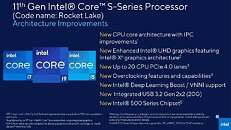Monday, December 28th 2020

Intel Core i7-11700K "Rocket Lake" CPU Outperforms AMD Ryzen 9 5950X in Single-Core Tests
Intel's Rocket Lake-S platform is scheduled to arrive at the beginning of the following year, which is just a few days away. The Rocket Lake lineup of processors is going to be Intel's 11th generation of Core desktop CPUs and the platform is expected to make a debut with Intel's newest Cypress Cove core design. Thanks to the Geekbench 5 submission, we have the latest information about the performance of the upcoming Intel Core i7-11700K 8C/16T processor. Based on the Cypress Cove core, the CPU is allegedly bringing a double-digit IPC increase, according to Intel.
In the single-core result, the CPU has managed to score 1807 points, while the multi-core score is 10673 points. The CPU ran at the base clock of 3.6 GHz, while the boost frequency is fixed at 5.0 GHz. Compared to the previous, 10th generation, Intel Core i7-10700K which scores 1349 single-core score and 8973 points multi-core score, the Rocket Lake CPU has managed to put out 34% higher single-core and 19% higher multi-core score. When it comes to the comparison to AMD offerings, the highest-end Ryzen 9 5950X is about 7.5% slower in single-core result, and of course much faster in multi-core result thanks to double the number of cores.
Sources:
Leakbench, via VideoCardz
In the single-core result, the CPU has managed to score 1807 points, while the multi-core score is 10673 points. The CPU ran at the base clock of 3.6 GHz, while the boost frequency is fixed at 5.0 GHz. Compared to the previous, 10th generation, Intel Core i7-10700K which scores 1349 single-core score and 8973 points multi-core score, the Rocket Lake CPU has managed to put out 34% higher single-core and 19% higher multi-core score. When it comes to the comparison to AMD offerings, the highest-end Ryzen 9 5950X is about 7.5% slower in single-core result, and of course much faster in multi-core result thanks to double the number of cores.


114 Comments on Intel Core i7-11700K "Rocket Lake" CPU Outperforms AMD Ryzen 9 5950X in Single-Core Tests
BTW, Clang is the C/C++/ObjC frontend for LLVM, a very common compiler, nothing to do with JavaScript.
Especially when you consider that modern Javascript is JIT-compiled into assembly language these days.
Per-Core L1-L2 Caches:
10700K: 32KB-32KB-256KB
11700K: 32KB-48KB-512KB
5950X: 32KB-32KB-512KB
Although Intel now offering a bigger L1 Data Cache (48KB) than AMD's flagship (32KB) looks like a bit of desperation, and/or the inability to make the gains elsewhere.
Typical workload for me would include VPN to corporate network, 4-6 browser tabs, 1-4 server RDP connections, one or more SSMS (SQL Server) connections, connection to SVN code repositories, and one or more SSH connections. All of these are encrypted, and while not all are in use at once (maybe one or two) many like RDP are exchanging data to do things like screen updates.
A typical user may have even more connections, albeit different types. Shared file systems - and all the different apps that can use that (many, many), web tabs, Oracle application UIs, SSH to unix applications, and so on. Most if not all are secured connections, hence encrypted.
So yeah, AES performance is critical.
There's a relatively new benchmark out for the 11700K. This one is on Geekbench 4.4
browser.geekbench.com/v4/cpu/15972177
Or it will be, 1.5x the price DDR4 - no thank you, lmfao
At best, we're talking about the very end of 2021, much more likely mid-2022.
People should generally not wait unless the next big jump is imminent.
PCIE 5 and DDR5 will be much more relevant for HEDT and servers than the mainstream.AES is important, yet do you know if all those applications are rewritten and recompiled to use these new AES instructions? (hint: they're not)
So unless someone rewrite that software and recompile it, those Geekbench scores are not that useful.
Most of the time, you don't even do that. An example of something standard would be, where I deploy a web application that is using HTTPS (handled by IIS) and possibly a SSO service like GetAccess. The web developer does not write any encryption algorithms for that, it's part of IIS.
VAES512 has been around since 2017. It is not the same thing as AVX-512 which you may be getting it confused with. It's already used on most encryption libraries, and by most operating systems, and major 3rd party encryption / security providers.
The single core performance must have substantially been improved then.